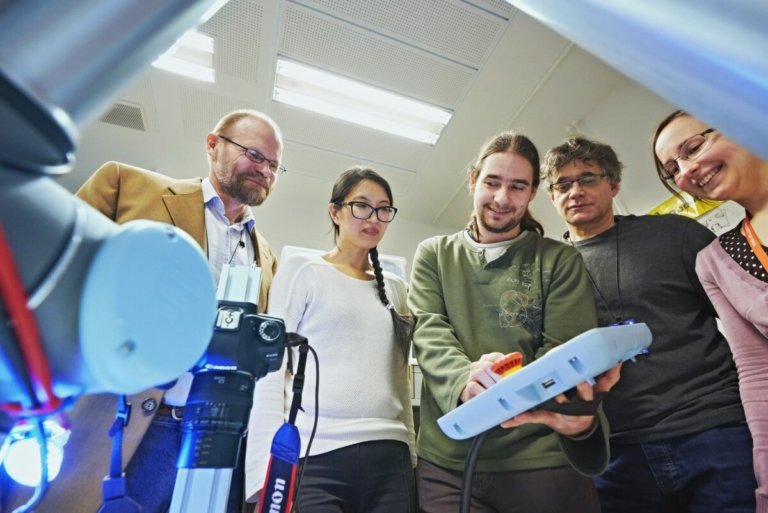
The University of Oulu is an international science university, and one of the largest and the most multidisciplinary universities in Finland.
Every day, 2.6 billion people use technology developed in Oulu – known as the Silicon Valley of 5G. In addition, the university’s Arctic location offers unique conditions for a wide variety of research.
The combination of a science and technology university provides an excellent basis for influential research. The eight faculties and research units at the University of Oulu form a strong science community, making it possible to pursue ground-breaking, multidisciplinary research.
Close cooperation with research institutes, companies, and the public sector has created an internationally significant research and innovation hub that has changed the world in numerous ways throughout the years.
Exciting research for a tech-enabled future
At the Faculty of Information Technology and Electrical Engineering, professors and researchers are exploring the ways digitalisation can work for everyone, including sensing and ubiquitous wireless sensor systems, wireless communication, and other novel services and systems.
The research is aimed at future information infrastructures, integrating aspects of technology adoption by complex human groups, communities and societies. Multidisciplinary research activities in the focus area are co-ordinated by Infotech Oulu.
Since the 1990s, the university’s research has made waves in numerous European research and innovation programmes. They’re constantly at the forefront of new technologies in wireless communications.
They are leaders of cutting-edge research in 6G wireless communication. While the world eagerly anticipates widespread commercial use of 5G networks, the university is already looking ahead at what comes after that.
Key research areas include radio access network technologies, signal processing and optimisation, radio frequency systems and design, virtualised networks, visible light communications, medical communications and the whole infrastructure and standard definition of 5G and 6G technology.
The 6G research flagship programme at the University of Oulu is one of the first ones in the world. Students who study at this progressive university benefit from an ecosystem that values innovation and scientific breakthroughs.
There are also exciting projects that look into how technology will play an even larger role in the future.
The University of Oulu’s GenZ project, for example, sets out to conduct research on the human approach to digitalisation.
GenZ aims to include human sciences in the development of smart technologies, typically driven by the viewpoint of engineering. The project’s second objective is to develop people’s own skills and capacity to handle the upheaval brought about by digitalisation.
Developing engineers of the future
The university offers a two-year Master of Science (Technology) programme in Wireless Communications Engineering.
As an international programme, students get to socialise with students and staff from all corners of the globe, giving them a global perspective and allowing them to learn from their peers.
Students receive cutting-edge knowledge in wireless communications both at physical and network layers, learning how to design and implement wireless solutions for 5G networks, Internet-of-Things (IoT) devices and smart energy-efficient wireless sensor applications.
Once they graduate, students are well-equipped with relevant skills of the latest radio engineering methods, tools and technologies, and possess the ability to design RF electronics for smart phones and base stations of mobile systems.
 Courses in this programme cover the subjects on advanced wireless communications systems, communications networks, stochastic signal processing methods, radio channel modeling, radio and antenna engineering, information theory, coding methods, as well as several electronics design, digital signal and video processing, computer engineering and Finnish language courses depending on students’ selection.
Courses in this programme cover the subjects on advanced wireless communications systems, communications networks, stochastic signal processing methods, radio channel modeling, radio and antenna engineering, information theory, coding methods, as well as several electronics design, digital signal and video processing, computer engineering and Finnish language courses depending on students’ selection.
Here, graduates receive a strong foundational background in a growing, dynamic field of wireless communications, including networking, systems, algorithms and technologies.
The skills gained in the programme offer solid academic training that can rise to the challenge and demands of the rapidly growing wireless communications industry.
Graduates from this programme typically find work opportunities in telecommunication and electronics industry, network operators, research laboratories, scientific universities, universities of applied sciences, or state officials.
An education from the University of Oulu positions learners as leaders in technology who are up-to-date on the latest in wireless communication technology, able to do research on future technologies, and possess the relevant skill sets employers are looking for today.
Follow the University of Oulu on Facebook, Twitter, YouTube, Instagram and LinkedIn
Liked this? Then you’ll love…
Bridging research and education in computer engineering and electronics







